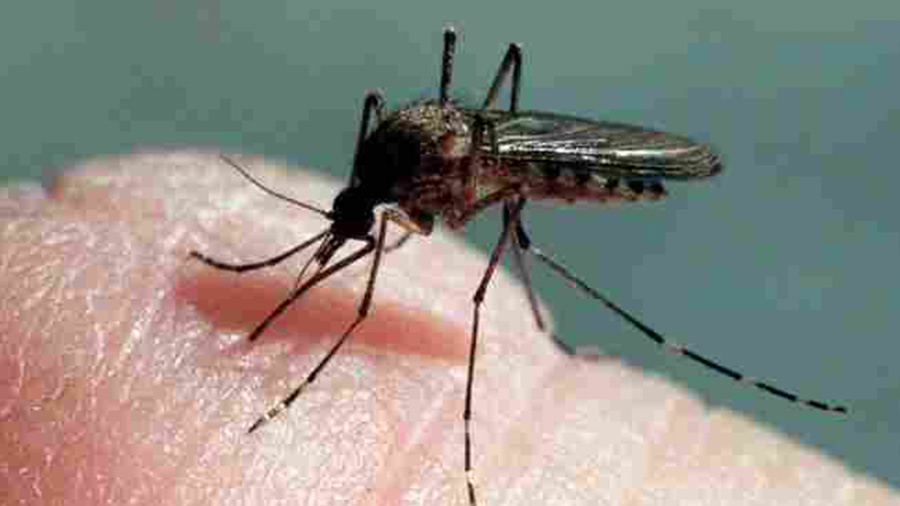The total involvement with Covid-19 the last two years has meant that work for control of other diseases such as dengue and malaria came to a stop. We are now suffering for it. Currently, local bodies are rallying to the cause — fogging, spreading bleaching powder and cutting down banana and taro plants because these are said to attract mosquitos. Unfortunately, none of these measures will be able to prevent the further spread of dengue.
Vector control, or minimising growth of mosquitoes through use of insecticides and eliminating breeding environments, is the best way to tackle dengue, the mosquito-borne disease that has no medicine. But this year, as the rains linger right through autumn, the shallow puddles of water that are the perfect nursery for Aedes aegypti — carrier of the dengue virus — have proliferated.
“It will be impossible to prevent the spread of dengue in Calcutta and its surroundings without a change in the social, political, cultural and educational environment,” says Dr Amitabha Nandy, former head of the Calcutta School of Tropical Medicine and consultant virologist.
There are, however, steps we can take as individuals to minimise our chances of getting dengue and, if we do get it, to ensure it does not become critical.
To avoid mosquito bites, wear clothes that fully cover your arms and legs and use insect repellent.
Use a mosquito net at night and try to keep babies and children within a mosquito net as much as possible.
Replace the water in vases regularly and once a week throw away water in buckets, planters, pools and birdbaths.
If possible, cover all windows with nets to restrict the entry of mosquitoes.
Despite taking these measures, there is always a chance that one will get dengue. In that case, one will have to know how to keep the disease from becoming critical. That is not as easy as it sounds because a lot of things we learnt from social media are untrue.
Platelets
“In my several years of observation, papaya leaves, whether raw or in tablet/capsule form, didn’t show any platelet increasing or disease curing property but lead to gastritis and complacency-related loss of vital therapeutic time,” says Dr Nandy. Actually, no external factor can increase platelet count, it is a deficiency the body itself has to make up. And a lower platelet count does not automatically warrant hospitalisation, it is only when there is some sort of bleeding that the platelet count becomes important.
Platelets carry the coagulating or blood clotting factor; a lower value will mean blood will take more time to clot and the person will end up losing more blood. That is why women who get their periods soon after being diagnosed with dengue should keep a watch on how much blood they are losing. It is also the reason women of child-bearing age are considered a high-risk group.
It is because of this clotting problem that no intramuscular injections — since blood is slow to clot it may seep into the surrounding tissue — should be given during dengue, all shots must be intravenous. Also, no operative procedures should be scheduled while recovering from dengue.
Digestion
Dengue causes changes in the inner lining of the stomach too, so a soft and non-spicy diet is recommended for recovering patients. Avoid red meat and opt for soups; the cornflour used to thicken soup has a soothing and protective effect. Do not eat any foods — such as citrus fruits — that may create hyperacidity. Acidity can lead to retching, which will damage the weakened stomach walls. In fact, eating too many fruits is not ideal, the fibre ingested will do more harm than good. Also, there is no proof that eating kiwi fruit helps recovery.
Water
These days, it is often recommended that fever patients drink a lot of water. It supposedly washes away the toxins in the body and may help flush out the virus too. But since the capillaries get dilated in dengue, drinking too much water may just mean swollen arms and feet as water seeps out of capillaries into surrounding tissue. So dengue patients should drink water only when thirsty and forget about taking in a prescribed amount.
The most important thing you can do for a dengue patient is to give him or her the time to recover, do not overcrowd the patient with visitors. If your friend or relative is suffering from dengue, pick up the phone to find out how he or she is. All dengue patients are immunologically compromised, the more people they are exposed to, the more is their chance of picking up an infection and complicating their disease.
Keep in mind all the points given above and you will be able to handle a dengue situation calmly and well.
WARNING SIGNS
Take a patient to hospital when there is
Very high fever that does not respond to oral medication
Frequent vomiting
Extreme fatigue
Swelling in the body
Bleeding from anywhere or heavy or irregular menstrual bleeding
Change in colour of urine to deep yellow
Shortness of breath
Delirium
Drowsiness
Convulsion
Low urine output
Diarrhoea










